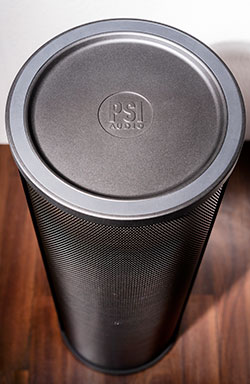Swiss company PSI Audio has announced a sibling to its original AVAA C20 bass trap, with the new C214 offering the AVAA (Active Velocity Acoustic Absorber) principle in a more compact, yet still efficient form. Together, C20 and C214 form the AVAA family.
 Dubbing the AVAA C214 ‘an entirely new kind of product’, the company have found a means of implementing the AVAA principle using DSP, overcoming the challenge of reaching a latency of under 0.2ms. The use of digital technology makes AVAA more flexible by virtue of an app that allows adjustment of sensitivity enables it to be switched it on and off either individually or in groups. While mainly aimed at audiophiles and home users, this feature may benefit studios as well, if engineers wish to tailor the room response to the sound being produced.
Dubbing the AVAA C214 ‘an entirely new kind of product’, the company have found a means of implementing the AVAA principle using DSP, overcoming the challenge of reaching a latency of under 0.2ms. The use of digital technology makes AVAA more flexible by virtue of an app that allows adjustment of sensitivity enables it to be switched it on and off either individually or in groups. While mainly aimed at audiophiles and home users, this feature may benefit studios as well, if engineers wish to tailor the room response to the sound being produced.
The basic principle of the AVAA C214 remains the same – it eliminates room modes caused by reflective surfaces. While passive absorbers require a lot of material (sometimes metres thick) or resonant absorbers tuned to a specific frequency, the AVAA claims to eliminate resonant frequencies between 15Hz and 160Hz as effectively as a passive absorber 45 times its size. It does not affect the direct sound from the loudspeakers, as room correction devices do, and it does not work with anti-sound, so the room modes are eliminated for the entire room,and not just its sweet spot.
The AVAA C214 imposes an acoustic impedance in front of the device – acting like a ‘black hole’ in the wall. Instead of being bounced back, the respective sound waves are sucked in by the C214. This acoustic black hole is now even more compact and easy to install, with wall brackets to place it wherever required in the room. Its maximum acoustic impact is complemented by its minimum visual impact, as it is available in black and white.
More: www.psiaudio.swiss









